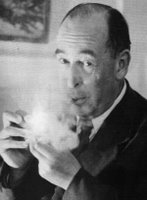C.S. Lewis: Not a Pacifist...and Not Interested in Political Policy, but Longstanding Principle.
 A provocative C.S. Lewis quote from an old post on the temporarily subdued blog Window in the Garden Wall...
A provocative C.S. Lewis quote from an old post on the temporarily subdued blog Window in the Garden Wall..."Why I Am Not a Pacifist" from The Weight of Glory (1949):
If not the greatest evil, yet war is a great evil. Therefore, we should all like to remove it if we can. But every war leads to another war. The removal of war must therefore be attempted. We must increase by propaganda the number of Pacifists in each nation until it becomes great enough to deter that nation from going to war. This seems to me wild work. Only liberal societies tolerate Pacifists. In the liberal society, the number of Pacifists will either be large enough to cripple the state as a belligerent, or not. If not, you have done nothing. If it is large enough, then you have handed over the state which does tolerate Pacifists to its totalitarian neighbour who does not. Pacifism of this kind is taking the straight road to a world in which there will be no Pacifists.
...then you have handed over the state
which does tolerate Pacifists
to its totalitarian neighbour
who does not
 From John G. West in "Finding the Permanent in the Political: C. S. Lewis as a Political Thinker":
From John G. West in "Finding the Permanent in the Political: C. S. Lewis as a Political Thinker":The year was 1951, and England was embroiled in a bitter general election campaign. Six years earlier the Conservative Party of Winston Churchill had been thrown out of power. Now the same party, still led by the same indomitable Churchill, was attempting a comeback. The conventional wisdom was that the attempt would fail. The conventional wisdom was wrong. Voters went to the polls on October 25, and the next morning the whole world knew that the Conservative Party had recaptured control of Parliament and Churchill had regained the post of Prime Minister.
Within a few weeks of the change of power, Churchill's office sent a letter to C. S. Lewis, inviting him to receive the honorary title "Commander of the British Empire." One can only guess what Lewis thought when he first read the letter, but one suspects that he appreciated it, for he greatly admired Churchill.~~~
It is startling to note just how many political topics Lewis broached in his writings: crime, obscenity, capital punishment, conscription, communism, fascism, socialism, war, vivisection, the welfare state, the atomic bomb. When Lewis talked about these matters, however, it was not in the way most politicians do. He was wholly unconcerned with what political scientists today like to call "public policy"--that conglomeration of compromise, convention, and self--interest that forms the staple of much of our own political diet. If you expect to find a prescription for solving air pollution or advice on how to win an election, don't bother reading Lewis. He has nothing to tell you. His concern was not policy but principle; political problems of the day were interesting to him only insofar as they involved matters that endured. Looked at in this light, Lewis's penchant for writing about politics and his simultaneous detachment from the political arena seem perfectly explicable. It is precisely because Lewis was so uninterested in ordinary political affairs that he has so much to tell us about politics in the broad sense of the term. By avoiding the partisan strife of his own time, he was able to articulate enduring political standards for all time...
His concern was not policy
but principle~~~
Contrary to those Christians who reject natural law, however, this problem of uncertainty cannot be solved by replacing the law of nature with the law of revelation as expressed in the Bible. The Bible rarely gives particular advice on specific political issues. It does not tell us whether to build nuclear missiles or invade Panama; it does not inform us what type of social programs to enact, if any; it does not guide us in our choice of the best tax system. The Bible invariably requires interpretation if it is to be used as a political guidebook, and interpretation opens the door for misconstruction. The Bible is infallible; but its interpreters are not. So the Bible can be abused and misused as much as natural law.
uncertainty cannot be solved by
replacing the law of nature
with the law of revelation
Now I am not arguing--and I know Lewis would not argue--that the Bible has no role in the area of morality. But in a society that is not a theocracy the Bible can never be the only standard of morality. The Christians who lived during the American Founding recognized this fact, and their political rhetoric was fashioned accordingly. They spoke regularly of the "Laws of Nature and Nature's God" and of acting in accord with both "reason and revelation." They saw natural law as the necessary meeting point for citizens of all religious beliefs. Like the early American Christians, Lewis recognized the inescapable need for natural law. Christians today would do well to heed his advice.
-Home-
Labels: Apologetics



















-Home-